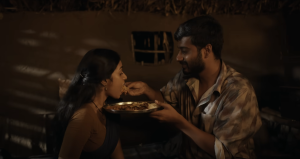Raj Rachakonda's ‘23’ Takes a Hard Look At Caste and Social Justice
A former IT professional from the US, bitten by the cinema bug, landed in the world of Telugu cinema with the story of a simple invention that changed the life of many weavers of Telangana. He made critically acclaimed films like Mallesham and 8 AM Metro, creating a niche for himself in the Telugu and Hindi film industry.
Raj Rachakonda is now out with his new release, 23, a story of social justice and redemption. The film is based on true events that took place in Andhra Pradesh in the 90s. It discusses three events with underlying caste dynamics, where the victims and the injustices they faced have been largely forgotten today.

A still from 23. Photo: Screengrab from video.
These events are the Tsunduru massacre (1991), Chilakaluripet bus burning (1993) and Jubilee Hills car bomb blast (1997). The film shows how the convicts are treated differently by the justice system, depending on the social strata they come from. The brutality of these instances can be felt by the audience throughout the film.
The film opens in Andhra Pradesh of the 90s, before its bifurcation, when there were regular breakouts of caste based atrocities, especially against the Scheduled Caste (SC) community.
Unequal people cannot be treated equally – an idea discussed by Jawaharlal Nehru in his book Discovery of India – stands true in 23. The film looks at the injustices faced by the victims as well as what compels people to commit crimes while questioning what true justice really means when both victims and perpetrators are left grieving.
The film introduces several new faces: Teja playing the role of Sagar and Tanmai playing the role of Susheela.
The story revolves around a desperate decision made by the protagonist, Sagar, who believes that a loan of Rs 10,000 will change his life. But things take a turn for Sagar and his friend Das (played by Pavan Ramesh) as they get drawn into a spiral of life-altering events.
Das, with his dark sense of humour, highlights the reality of how his community is treated as the 'other' in society. Ramesh’s performance as Das complements the righteous nature of Sagar.

A still from 23. Photo: Screengrab from video.
The Constitution acknowledges the deep-rooted inequalities of Indian society in its aim to treat people equally. However, when we try to treat everyone as ‘equal’ without recognising their individual circumstances – the social strata they come from, their economic identity, financial power and their cultural identity – it results in a legal equality that doesn't always translate into real, lived equality. This paradox has shaped the lives of many in India—an idea the film explores with depth and nuance.
The movie further dwells into Sagar and Das's redemption and rehabilitation – not just in society but also within the prison walls – with the help of a psychologist (played by Jhansi). Jhansi’s role, although brief, has a lasting impact. The questions posed by her make us introspect the way we look at the people around us.
Sagar and Das are accompanied by a fellow inmate – portrayed remarkably by Ramilla Ramesh – who understands what it takes to survive in prison.
Just like any good Indie film, 23's writing is its strongest suit. The film addresses many important issues ranging from systemic complexities that haunt the prison system, especially for minority communities, to the well being of not just the victims and their families but the prisoners and their families as well.
It would be easy to see this film through a binary of 'system versus an individual' or 'society versus an individual', but the movie goes beyond that. It sheds light on how society treats an SC woman in rural India. The whole idea of social justice and equality takes on a different meaning when one witnesses the reality.
The film empathises with criminals without justifying or endorsing their actions. Mental health is rarely discussed, especially when it comes to prisoners. While the gore, horror, and politics of jail are often highlighted, the rehabilitation of inmates is usually overlooked. We often forget that those convicted of crimes are human too.
Cinema has a responsibility to educate and inform, not just entertain. While I don’t always agree with this, I do believe a movie should make you think, question and spark important conversations. This film certainly does that.
Dheera Konduri graduated in Mass Communication and Journalism from St. Francis College, Hyderabad and studied Filmmaking at the Dadasaheb School of Film Studies. She is a theatre enthusiast and practitioner.
The Wire is now on WhatsApp. Follow our channel for sharp analysis and opinions on the latest developments.




